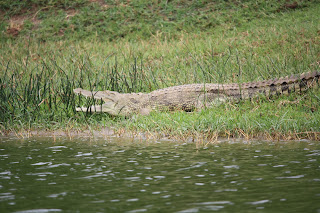This month, I am living with a family
that includes two boys in elementary school. I asked them if I could
interview them so I could let my friends in America know what kids in
Rwanda are like. They were happy to share their lives with you!
Meet Prince, age 9, and Joshua, age 8!
This is their house. It contains a dining room, living room, and five bedrooms. There is a separate kitchen building outside where their mom cooks, and a separate building that has a toilet and water for bathing.
Me: What grade are you in?
Prince: P3 (third grade)
Joshua: P2 (second grade)
Me: What subjects do you study at
school?
Prince: There are many! French,
English, and Kinyarwanda (the language in Rwanda)
Joshua: Social, English, and French
Me: What subject is your favorite?
Prince: English
Joshua: English
Me: What time do you leave for school
in the morning, and what time do you come home?
Prince and Joshua: Leave at 6:00,
return at 1:15.
Me: How do you get to school?
Prince: Sometimes we take the bus, and
sometimes we drive.
Me: How many teachers do you have?
Prince: 5
Joshua: 3
Me: What do you like to do for fun?
Prince: Play football! (In Rwanda, kids call soccer “football.”)
Joshua: To go out to lunch.
Me: What is your favorite sport?
Prince: Football (soccer).
Joshua: Tennis.
Me: What is your favorite food?
Prince: Chips (french fries).
Joshua: Ice cream.
Me: What is your family like?
Prince and Joshua: There are 5 sisters
and 4 brothers (including us).
*Prince and Joshua are the youngest of 9 siblings! Four of their older sisters, ages 16-23, live at home. Two older brothers and an older sister have grown up and moved away. They both said that they enjoy visiting their grandmother, who lives nearby!
Me: What do you want to be when you
grow up?
Prince: I want to be a doctor.
Joshua: I want to be a pastor.
Me: What is your favorite animal?
Prince: Dog.
Joshua: Lion.
Me: What do you do to help around the
house?
Prince: I wash plates.
Joshua: I help to escort (show people
around).
Me: What would you say to kids in
America?
Prince: That I love them.
Joshua: I love them and God bless them!
I hope you enjoyed getting to meet my "little brothers!" If you have any questions for them, let me know, and I will ask!
Love,
Miss Jacobs



















